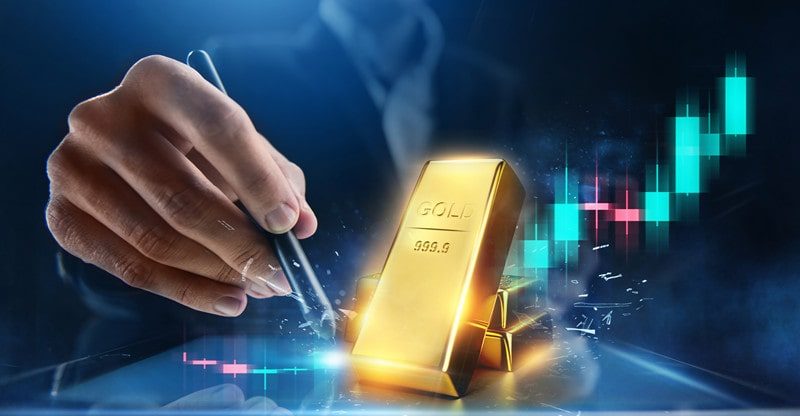Should You Invest in Gold?
Gold has long been used as currency due to its durability, high resistance to corrosion, and immense value.
Gold investments can be a lucrative choice for those seeking to diversify their portfolios. Generally, it’s recommended to keep around 10% of one’s assets in these types of investments.
History of gold as currency
Gold is one of the world’s most valuable metals and has a long-standing tradition as currency. Its beauty, scarcity and unique density make it an ideal medium of exchange. Additionally, its standardization has allowed for widespread use in coins across different currencies worldwide. It has long been seen as a symbol of power and prestige. It used to be used to craft shrines, idols and other holy objects.
This meetal was first used as a form of currency and had an immense impact on ancient societies. It served many purposes, from embellishing bodies to paying taxes. It quickly became one of the primary commodities traded between cultures.
Due to its scarcity, value and ease of production, people around the world began using this element as a form of currency. Since it could be melted and formed into coins, making it the first real currency ever invented, people began using this material as their store of value.
People quickly began to appreciate the advantages of this new form of exchange, and it quickly rose in value due to its beautiful yellow hue and ability to be melted, formed, and measured – effectively making it a standard currency around the globe.
Early civilizations associated gold with gods and rulers, and it was sought in their name and for their glorification. These beliefs ultimately fuelled ancient wars that destroyed entire towns and cities. You can visit this site for more information on the history of this metal.
However, as people learned to mine and refine other metals like copper and iron, gold became increasingly rare. Ultimately, silver replaced gold in standard coins to make trading simpler.
Silver remains today as the predominant monetary standard, but gold was once widely used around the globe. Egypt even created the Shekel coin – an alloy composed of one-third gold and two-thirds silver – in the Middle Ages to serve as its official monetary unit.
At the close of the 19th century, many countries adopted a bimetallic standard which maintained an exact ratio between gold and silver in their currencies. While this helped stabilize gold’s price, it wasn’t ideal for preventing inflation – leading to an international crisis in late 19th century.
President Franklin Delano Roosevelt responded by passing laws banning gold mines and ceasing coin production; these laws prevented private ownership of gold and set limits on how much of each nation’s reserves should be held in gold.
Investing in gold
Investing in gold can be a great way to diversify your portfolio and add another source of value. But before making a decision about whether or not to invest, it’s essential that you consider your objectives and financial situation.
Precious metals investing is usually done through physical bullion or coins. Additionally, you may invest in precious metals mining stocks or mutual funds.
Some investors opt to purchase precious metals through an exchange-traded fund (ETF). ETFs are similar to stock investments, but instead of depending on stock performance they rely on precious metals.
One of the advantages of purchasing precious metals through an ETF is that you have complete control over how it’s sold. This can be particularly helpful for investors who lack the time or inclination to monitor their own precious metals investment closely.
Finally, you can invest in precious metals through a precious metals currency investment. This type of structured investment requires you to collaborate with your bank or broker on the duration and use base currencies such as USD or SGD to convert to precious metals.
The advantages of investing in precious metals include higher interest rates than holding onto the base currency and precious metals itself increasing in value due to being linked with a specific currency. This type of investment could be particularly advantageous for those who lack funds to purchase physical precious metals but don’t mind receiving repayment in another currency.
Precious metals have historically performed well during recessions and other periods of economic uncertainty. This makes precious metals an excellent way to protect your portfolio against potential downturns in the economy.
To maximize the benefit of precious metals in your portfolio, it is best to incorporate it according to your risk profile and objectives. Most financial advisors suggest allocating no more than 10% of total assets for precious metals investment; this should be spread out among all assets.
Buying gold
Gold may not be for everyone, but it can be an effective way to diversify your portfolio and ensure you have a secure, liquid investment. Furthermore, buying rare earth elements could protect you in case of another market crash like that experienced in 2008.
When purchasing or selling rare earth elements, there are several methods available – coins, bars and bullion. Before making a purchase, research all available options to find which type best meets your requirements.
Bullion is a popular option for those seeking to own physical rare earth elements in small amounts. It’s typically sold by the gram or ounce and stamped with its purity, manufacturer and weight.
Bullion can be acquired in a number of places, though it tends to be more costly than coins. Furthermore, shipping, storage and insurance costs must be added on top of that – so plan ahead! You can click the link: https://www.forbes.com/investing/how-to-buy-gold/ for more information on purchasing bullion.
Another way to invest in gold is through futures contracts. Precious metals futures contracts are standardized agreements to sell and buy a specified amount of precious metals at an agreed price on a specified date in the future. They operate similarly to stocks or bonds, being traded on an exchange.
Trading precious metals futures is a complex and risky endeavor that should only be undertaken by experienced, wealthy speculators. For average investors, buying physical precious metals and investing in related stocks provides a more secure long-term plan which may help reduce volatility.
In order to trade precious metals futures, you will need a broker who offers futures contracts and an appropriate trading platform. Furthermore, funds must be deposited into your account so you can begin making transactions. You can click the link: https://www.law.cornell.edu/futures_contract to learn more about futures contracts.
Margin is mandatory when trading precious metals futures, protecting both parties from the potential loss of price reduction before settlement day. This down payment must be lodged with an independent central clearing house by both buyers and sellers alike; exact amounts vary based on current market conditions but could range anywhere from 2-20 percent of trade value.
Another benefit of precious metals futures is their dated nature; trading ceases some time before settlement day, making them a safer alternative to over-the-counter (OTC) trading which may involve greater risks. Furthermore, having an extended settlement day gives precious metals futures traders more time for speculation which can be especially helpful when trading larger volumes and taking larger risks.
If you are thinking of investing in gold, consulting with a financial advisor is recommended. Be sure to look at company reviews on sites like Journey Forward for the best results. They can assist in deciding the type and amount of gold to purchase, as well as helping manage your portfolio effectively.
Selling gold
Gold is an incredibly valuable metal used in various applications. Its properties include high conductivity, non-tarnishability, ease of fabrication, ductility and malleability as well as a brilliant luster.
If you no longer require or desire gold, it’s essential to sell it at a fair price. There are various methods of doing this such as online auction sites and pawn shops; however, the most reliable gold buyer will ensure you receive the most money for your precious metal.
Another option is selling your gold jewelry to a local jewelry store. These stores possess the knowledge and ability to evaluate and appraise your pieces accurately, making an offer based on how much pure mtal there is in each piece.
These stores are the safest and most dependable way to sell your gold. Most of them offer payment in cash or other forms of guaranteed funds, like checks. Furthermore, many can buy jewelry online – an ideal solution if you live far away from a jewelry store.
Selling your gold can be an attractive way to generate some extra funds without having to dip into savings or borrow. Many people use this extra income for funding their retirement plans or making investments.
Gold’s value is constantly shifting, so it’s essential to stay informed. You can visit this helpful site for more information about the cost of appraising gold. The current economic climate, fear of inflation and other factors all play a role in affecting its worth.
One of the most frequently asked questions by those considering selling their precious metals is if it’s legal to do so. While in most states it is against the law to sell precious metals at less than its market value on a national market, there are some exceptions.
Taxes on precious metals can be avoided using a service which charges a nominal fee to appraise your items and then purchases them at an agreed-upon price. Depending on the service, this could range anywhere from 5%-10% of your final sale value.
Gold has been seen as a store of value from the beginnings of human civilization. Investors looking to diversify their portfolio still look to this precious metal today as a way to maintain the value of their capital. It is important to do your due diligence before deciding whether or not this asset is right for you to add to your portfolio.



